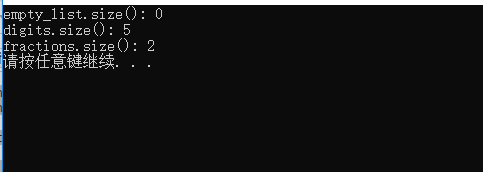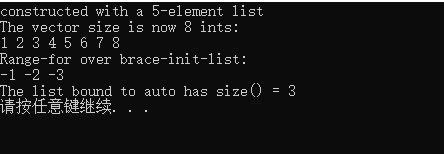Introduction to std::initializer_list
initializer_list is a new type provided by C++11, which is defined in the header file <initializer_list>. This header file is part of the tool library.
<initializer_list> is defined as follows:
namespace std {
template<class E> class initializer_list {
public:
using value_type = E;
using reference = const E&;
using const_reference = const E&;
using size_type = size_t;
using iterator = const E*;
using const_iterator = const E*;
constexpr initializer_list() noexcept;
constexpr size_t size() const noexcept; // 元素数量
constexpr const E* begin() const noexcept; // 首元素
constexpr const E* end() const noexcept; // 末元素后一位置
};
// initializer_list 范围访问
template<class E> constexpr const E* begin(initializer_list<E> il) noexcept;
template<class E> constexpr const E* end(initializer_list<E> il) noexcept;
}
The std::initializer_list type object is a lightweight proxy object that accesses an array of const T type objects.
std::initializer_list objects are automatically constructed at these times:
- Initialize an object using a braced initializer list, where the corresponding constructor accepts a std::initializer_list parameter
- The curly brace initializer list is the right operand of the assignment, or the function call argument, and the corresponding assignment operator/function accepts the std::initializer_list argument.
- Bind a braced initializer list to auto, included in a scoped for loop
initializer_list can be implemented as a pair of pointers or a pointer and its length. Copying a std::initializer_list does not copy its underlying object.
The underlying array is not guaranteed to survive the lifetime of the original initializer_list object. The storage of std::initializer_list is unspecified (i.e. it can be automatic, temporary or static read-only memory, depending on the occasion). (pre-C++14)
The underlying array is a temporary array of type const T[N] in which each element is copy-initialized from the corresponding element of the original initializer list (unless a narrowing conversion is illegal). The lifetime of the underlying array is the same as that of any other temporary object, except that initializing an initializer_list object from an array extends the lifetime of the array just as binding a reference to the temporary does (with exceptions, such as for initializing non-static class members). The underlying array can be allocated in read-only memory. (since C++14)
If an explicit or partial specialization of std::initializer_list is declared, the program is ill-formed.
1. Member type
| member type | definition |
|---|---|
| value_type | T |
| reference | const T& |
| const_reference | const T& |
| size_type | std_size_t |
| iterator | const T* |
| const_iterator | const T* |
2. Member functions
Constructor
| initializer_list() noexcept; | (since C++11) (before C++14) |
|---|---|
| constexpr initializer_list() noexcept; | (since C++14) |
#include <iostream>
#include <initializer_list>
int main(){
std::initializer_list<int> empty_list;
std::cout << "empty_list.size(): " << empty_list.size() << '\n';
// 用列表初始化创建初始化器列表
std::initializer_list<int> digits {1, 2, 3, 4, 5};
std::cout << "digits.size(): " << digits.size() << '\n';
// auto 的特殊规则表示‘ fraction '拥有类型
// type std::initializer_list<double>
auto fractions = {3.14159, 2.71828};
std::cout << "fractions.size(): " << fractions.size() << '\n';
}
The result is as follows:

- size : Returns the number of elements in initializer_list
- begin : Returns a pointer to the first element
- end : Returns a pointer to the position after the last element
3.Non-member functions
| std::begin(std::initializer_list) (C++11) | Specialized std::begin |
|---|---|
| std::end(std::initializer_list)(C++11) defined in header file | specialized std::end |
| rbegin(std::initializer_list) (C++14) | specialized std::rbegin |
| rend(std::initializer_list)(C++14) | specialized std::rend |
#include <iostream>
#include <vector>
#include <initializer_list>
template <class T>
struct S {
std::vector<T> v;
S(std::initializer_list<T> l) : v(l) {
std::cout << "constructed with a " << l.size() << "-element list\n";
}
void append(std::initializer_list<T> l) {
v.insert(v.end(), l.begin(), l.end());
}
std::pair<const T*, std::size_t> c_arr() const {
return {&v[0], v.size()}; // 在 return 语句中复制列表初始化
// 这不使用 std::initializer_list
}
};
template <typename T>
void templated_fn(T) {}
int main(){
S<int> s = {1, 2, 3, 4, 5}; // 复制初始化
s.append({6, 7, 8}); // 函数调用中的列表初始化
std::cout << "The vector size is now " << s.c_arr().second << " ints:\n";
for (auto n : s.v)
std::cout << n << ' ';
std::cout << '\n';
std::cout << "Range-for over brace-init-list: \n";
for (int x : {-1, -2, -3}) // auto 的规则令此带范围 for 工作
std::cout << x << ' ';
std::cout << '\n';
auto al = {10, 11, 12}; // auto 的特殊规则
std::cout << "The list bound to auto has size() = " << al.size() << '\n';
// templated_fn({1, 2, 3}); // 编译错误!“ {1, 2, 3} ”不是表达式,
// 它无类型,故 T 无法推导
templated_fn<std::initializer_list<int>>({1, 2, 3}); // OK
templated_fn<std::vector<int>>({1, 2, 3}); // 也 OK
}The result is as follows:
